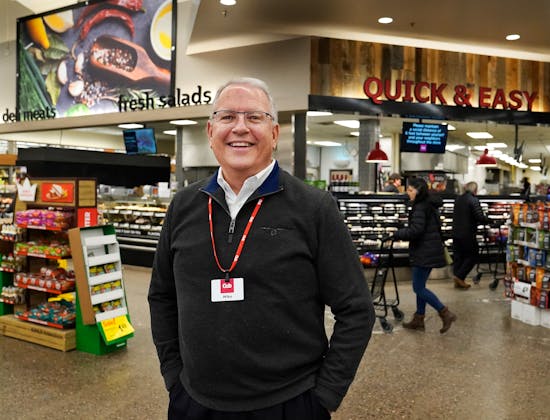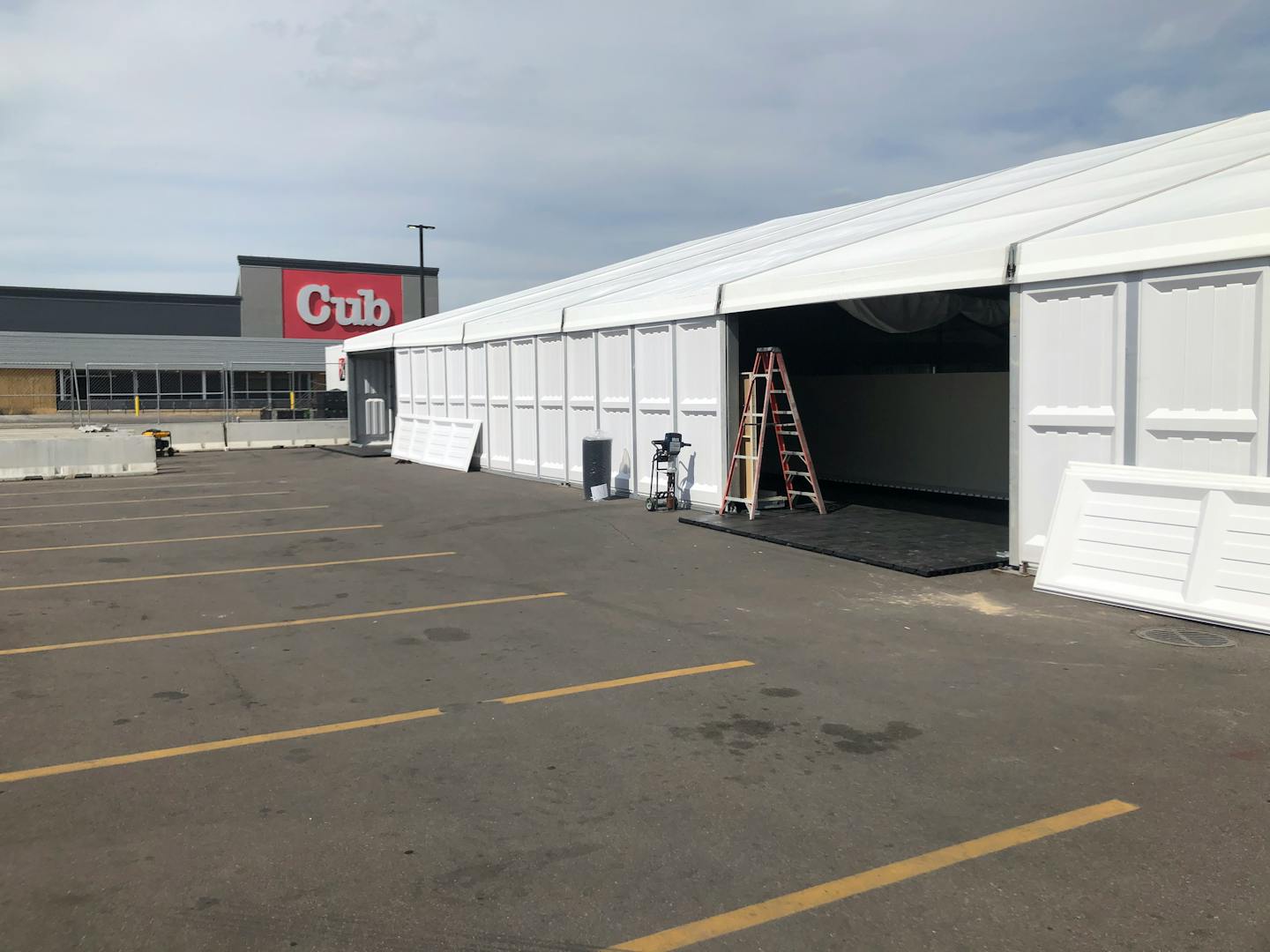Mike Stigers took the top job at Cub Foods in the spring of 2019, when no one working for the largest grocery chain in the Twin Cities was certain about its future.
Target was closing in on Cub's crown as the region's grocery king. Hy-Vee, the Iowa giant that dominates much of the Midwest, was opening several new stores a year in the market. Even European discounter Aldi had grabbed a solid share of Minnesotans' grocery dollars.
And what's more, its new owner, United Natural Foods Inc., a wholesale specialist that bought Cub's parent, Supervalu, in 2018, wanted to sell Cub and the other remnants of Supervalu's retail division. Cub employees knew executives like Stigers would be the first to go when a deal came through.
"The communication that we gave to the team every day is that if someone buys Cub, they're going to buy the best grocery company there is and let's be the best grocery company there is," Stigers said recently.
Today, Cub remains atop the Twin Cities market and is churning more profits for UNFI than it did in its last years under Supervalu. UNFI's executives say it's no longer for sale. Cub executives are drawing up plans for new stores to add to the 79 it already has.
Like many large grocery chains, Cub flourished in the pandemic when people who were forced to stay home from work and school changed their eating patterns. "Consumer trends, consumer needs, the pandemic, all of those things together have put the wind at the back of Cub," said Phil Lempert, editor of supermarketguru.com.
But even in 2019, while UNFI was seeking buyers, Cub continued to open and remodel stores, though not as many as the year before. In May that year, Stigers told the Star Tribune, "There's no slowing down the growth of this brand as we look for the correct suitor in the future."
Stigers, 63, began his career as a part-time courtesy clerk at Safeway in 1974 and worked his way up the management ranks at grocers and in other industries. He joined Supervalu in 2011 as president of Shaw's and Star Market grocery stores in New England. Supervalu sold those stores in 2013 and Stigers moved to the Twin Cities to take a leadership role in Supervalu's wholesale business, its largest.
In early 2020, even before the pandemic hit, there were signs that competitors were finding it difficult to overtake Cub's market dominance. Shortly before the COVID-19 lockdowns began, Hy-Vee scuttled plans for a distribution center in Minnesota and froze construction of several stores.
Then, as shoppers emptied shelves of toilet paper and hand sanitizer, Cub added 130 new safety protocols in 100 days, Stigers said. To keep up with shoppers filling its stores that spring, Cub went on a spree of hiring 1,000 people.
Its connection to UNFI and the former Supervalu wholesale operation gave Cub an advantage as some items turned scarce.
"The ability to keep your shelves stocked is key to getting repeat buyers," said Michael Swenson, chief agricultural economist at Wells Fargo. "We see Cub, the majors, they have an advantage. When a supplier has issues about trucks and they have to make allocation decisions, you always allocate to your premier accounts first."
Just as Cub was adjusting to the pandemic, the killing of George Floyd by a Minneapolis police officer on Memorial Day that spring led to riots that resulted in the looting and destruction of two Cub stores in Minneapolis — one on Lake Street and the other on Broadway.
Stigers had seen grocery stores destroyed in civil unrest and natural disasters before. He was a district manager for Jons Fresh Marketplace in Los Angeles during riots that ensued when police were acquitted of beating Rodney King in 1992. And in 2011, he led Shaw's as Hurricane Irene wrecked the northeastern U.S. and a tent market was quickly set up while a flood-ravaged store was rebuilt in Vermont.
"A grocery store is more than a grocery store," Stigers said. "It's really the heartbeat of a community."
In the immediate aftermath of the Minneapolis unrest, Cub shuttled customers of the stores to other locations until temporary stores were set up in giant tents. The Lake Street Cub opened last February and the store on Broadway, re-branded as Cub Northside, opened in May.
"There was never a question in my mind that we wouldn't reopen those stores," Stigers said. "Not even for a second."
Lisa Clemons, founder of the nonprofit A Mother's Love, was one of the community members who advocated for the Cub Northside name as well as a space in the store for a community center.
"To our hearts' delight, they decided to do that. We wanted a place where kids could be tutored and where seniors could gather. Cub did that and went beyond," said Clemons, also a retired Minneapolis police sergeant. "I was so surprised. I've never ever heard of a business wanting to rebuild and want to build out a space for community."
With the country in recession and no deals imminent for Cub, UNFI's then-Chief Executive Steve Spinner said in June 2020 that it would temporarily stop trying to sell the grocery business. UNFI needed to wait for demand for "really healthy retailers" to return, he said.
"And now it's not the right time to disturb the communities and everything that's going on with the retailing of food," Spinner added.
In the summer of 2021, UNFI reported that Cub and the Shoppers Food Warehouse, a smaller chain it owns in the mid-Atlantic states, had delivered about $100 million in adjusted pre-tax earnings over four quarters. Spinner told analysts that UNFI's entire leadership team was "so incredibly proud of what our retail division has done."
"They've been there, they've been open, they've been supporting the communities in so many different ways and yes, our financial results have been just incredible throughout the pandemic and they continue to be incredible," Spinner said. "I think as you know, we took them off the market and during COVID, we just didn't feel like it was an appropriate time to try to sell a retail business. And they are not back on the market today."
A short time later, Spinner retired and Sandy Douglas, former CEO of Staples Inc., became UNFI's new chief executive.
Cub's e-commerce business continued to grow, adding its wine and spirits businesses, around 30% last year, building from the huge leap it took during the pandemic. And in November, Cub said it would start its own online pickup and delivery service, no longer relying solely on third parties like Instacart to get its goods delivered.
In the two years ended last October, sales at the UNFI grocery business, dominated by Cub, were up 15%. Last month, UNFI Chief Financial Officer John Howard told analysts that Cub has "an outstanding leadership team that is in place there, spearheaded by Mike Stigers." He said UNFI would continue to invest and expand its retail units.
And to the same analyst group, Douglas revived an old argument for pairing wholesale and retail businesses.
"It's a great place for us to learn," Douglas said. "Our retail leadership team gives us really direct feedback about what they need and what programs, services, brands and other things we can do to serve them better. And that visibility is very helpful to us."
Grocery shopping volumes may decline as people eat at home less when the pandemic is finally brought to heel. But Cub executives are confidently scouting sites for a dozen new stores in the region.
"I think the best years of Cub are ahead of us," Stigers said.





